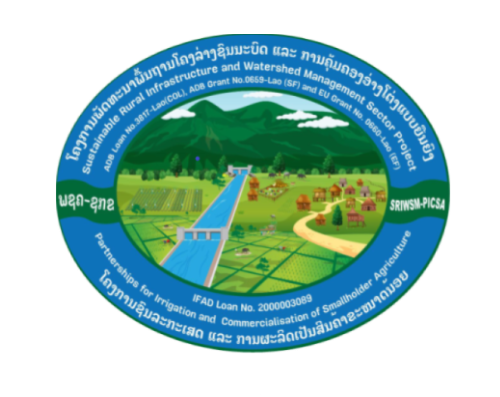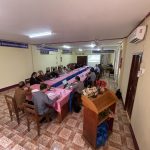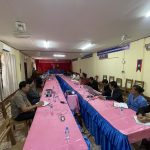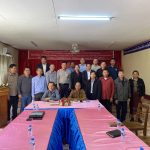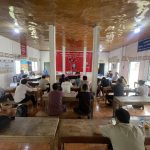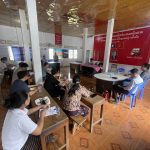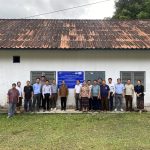On November 11, 2025, a Pre-Construction Consultation Meeting for the Rehabilitation and Repair of the Nam Poua and Nam Hom 1, 2 Schemes, under the ADB-funded Sustainable Rural Infrastructure and Watershed Management Project (SRIWSM) was held at the meeting room of the Agriculture and Environment Office of Sop Bao District, Huaphan Province.
The meeting was co-chaired by Mr. Thongleagn Sang-Anong, Deputy Director General of the Department of Irrigation (Advisor of the SRIWSM Project Management and Coordination Committee at the Central Level), Ministry of Agriculture and Environment, and Mr. Sano Sor-Inxay, Deputy Director of the Provincial Agriculture and Environment Section (PAES) of Houaphan Province.
Attendees included the Deputy National Project Coordinator, the Provincial Project Coordinator, the Project Implementation Consultant for the Department of Irrigation (DOI), and representatives from relevant sectors, totaling 22 participants (3 female) from Nam Hom and 25 participants (2 female) from Nam Poua.
Objectives of the Meeting
To receive a report on the preparedness for the rehabilitation and repair of the Nam Poua and Nam Hom 1, 2 Irrigation Schemes in Houaphan Province from the contractor (Daovieng Construction – Irrigation and Road Bridge Repair Sole Co., Ltd.).
To consult on and disseminate information regarding the construction and repair of the irrigation scheme (IRR) to the beneficiaries in the project’s target villages, especially the local village authorities and the Water User Groups.
To introduce various monitoring forms for supervising the IRR construction and repair to the construction contractor and the Provincial and District Irrigation Sectors, for use in site management and construction monitoring.
Summary of Presentations, Discussions, and Conclusion
The meeting heard presentations, reports, and discussions that were straightforward and constructive, leading to a consensus and the following conclusions:
The Contractor must prioritize and urgently proceed with the construction work, especially ensuring the readiness of personnel, machinery, and camp facilities in strict compliance with the funder’s terms and regulations. Work must be completed within the stipulated timeframe to minimize impact on the community’s production during the dry season, and to ensure technical standards and verifiability.
Reporting must be performed regularly (daily, weekly, monthly) to the Provincial Irrigation Sector and the PAES. This must include photographic documentation of daily activities and a monthly report on construction and environmental work submitted to the Central Coordination Office by the 28th of every month.
The Contractor must promptly submit outstanding documents, particularly Form 1, Form 2, the Work Plan, the Personnel Plan, and the Construction Drawings (before November 18, 2025), to the Central Project Office for approval. This is essential to prevent delays in the actual field implementation and ensure smooth coordination with relevant stakeholders, including local authorities, to avoid potential conflicts and negative impacts that could affect future construction work.
The Provincial Irrigation Sector is assigned to urgently propose the appointment of a District and Provincial Responsible Committee for on-site presence. This committee will be responsible for monitoring, verification, and approval of every work package before construction commences, and for creating a budget plan for the implementation work, serving as a reference point for the Provincial Project Steering Committee.
There must be seamless coordination from the Central to the Local level, with regular consultation and reporting on the implementation of the rehabilitation and repair work.
The Village Authorities must take the lead in clarifying information to the farmers in the project area, ensuring they are aware, understand, and provide cooperation to complete the work according to plan.
The Central Project Implementation Consultant will appoint one consultant to support the Provincial and District teams in monitoring and inspection. The Provincial Project Coordination Office must provide a workspace and facilitate the implementation of the work.
